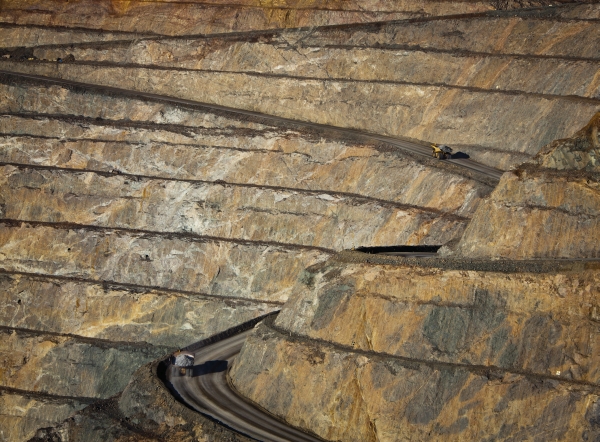Australia has the planet’s largest reserves of lead, nickel, uranium and zinc, and is amongst the world’s biggest economies. Yet slow growth and relatively high unemployment have led some to question whether the economy is heading towards recession

© Jason Benz / Shutterstock.com
The mood music around the health of Australia’s economy varies, depending on who is being asked. Disappointing growth in 2015 so far – the economy grew by just 0.2 per cent in the second quarter – has led commentators to ask whether Australia is heading for another recession. Meanwhile, Finance Minister Mathias Cormann argues that while other commodities-based economies, like Canada and Brazil, have slipped into recession, Australia’s economy is still growing, albeit more slowly than before.
“Given all of the external challenges that we’re facing, on the back of our economic plan for stronger growth and more jobs, the economy’s performing better than other similar economies in other parts of the world and that is surely good news,” he told ABC News 24 when the second quarter results were released.
But investment banks are warning that the housing market could collapse and drag the rest of the economy down with it. House prices have risen dramatically in Australia in recent years, with the property market becoming a major driver of the economy since the mining boom peaked and began to tail off. Over the last few months, however, signs of high household debt and a possible over-supply of housing has alarmed economists. Credit Suisse has warned that Australia’s property market is now “riskier than the equity market”.
Malcolm Turnbull’s post-takeover cabinet reshuffle saw Treasurer Joe Hockey lose his job to Scott Morrison, with Morrison immediately pledging to cut spending and return the budget to surplus. “We have a spending problem, not a revenue problem,” he said at his first press conference.
He also indicated that he would be moving away from Hockey’s focus on the global economy, which saw him putting a lot of emphasis on G20 and looking at multi-national tax avoidance. “My job as Treasurer now, I think, is very much to be a home Treasurer, a domestic Treasurer, one very much focused on the challenges in front of us.”
Historically, Australia has had a high degree of prosperity, based on its wealth of natural resources, policies of redistribution and welfare, and its stable democratic society. Its economy is among the largest in the world, ranking 19th in terms of GDP in 2014, according to the International Monetary Fund. Significant minerals mined in Australia include aluminium, coal, copper, diamonds, gold, iron, nickel, oil and gas, silver, tin, titanium, uranium and zinc. Proven reserves of oil were estimated in January 2014 to be four billion barrels, with 3.7 trillion cubic metres of gas.
Gold was first discovered in Victoria in the 1850s and prompted Australia’s gold rush. By the 1870s Australia had also become a major producer of tin, with deposits being mined in Tasmania. At the end of the 19th century, major mines had been established – copper and gold at Mount Morgan in Queensland; silver, lead and zinc in New South Wales; gold in Western Australia; and iron ore in South Australia.
Today, mining contributes nearly eight per cent of GDP, with Australia being the largest exporter of coal, iron, diamonds, lead, opal and zinc, and the second largest for gold and uranium (2008). The country has the world’s largest reserves of lead, nickel, uranium and zinc, with export earnings from minerals totalling US$146 billion in 2012-13. The mining sector’s growth has been driven primarily by huge demand for raw materials from China and other parts of Asia. Australia is home to the largest mining companies in the world, including BHP Billiton and Rio Tinto.
The country is also a major exporter of liquefied natural gas , which the government believes has considerable potential for further development, due to Australia’s abundant resources. But, despite having its own oil and gas resources, Australia is facing growing dependence on petroleum imports, thanks to expanding consumption in a period of declining production.
The economy relied mainly on agriculture and mining until manufacturing boomed after World War II. Service industries have primarily led growth since, rising from about 60 per cent of GDP in the 1960s to about 70 per cent in the 2000s. However, revenues have remained vulnerable to variations in agricultural output and fluctuations in world commodity prices.
There has also been a high level of foreign investment, but this has resulted in a serious current account deficit as interest and dividends leave the country. Domestic investment, by contrast, has been relatively low. In the 1980s major economic reforms were introduced to stimulate trade, including liberalisation of trade and foreign investment, deregulation of the financial system and markets, privatisation of public enterprises and government services, and decentralisation of wage settlements.
During the 2000s economic growth averaged three to four per cent a year, until the last quarter of 2008 when the global economic downturn saw a drop in commodity prices. With slower growth of 1.7 per cent in 2009, unemployment began to rise again after dipping to four per cent in early 2008 – its lowest level since the 1970s. But the economy recovered from 2010, growing by 3.7 per cent in 2012, 2.5 per cent in 2013, and an estimated 2.8 per cent in 2014.
So, are 2015’s disappointing second-quarter growth figures just a blip, or an early indicator of difficult times ahead? Unemployment figures have also been uncharacteristically high this year, at more than six per cent. But August saw the number of jobseekers fall, thanks to the creation of new jobs.
The last word goes to Shane Oliver, chief economist at investment house AMP Capital: “The Australian economy remains in a difficult period as the mining boom unwinds. Non-mining activity has bounced back, but is far from strong enough to offset the headwinds coming from the mining downturn.”
More articles on Australia
Australia’s fast moving premiers





